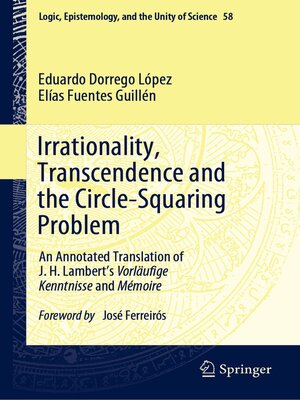Irrationality, Transcendence and the Circle-Squaring Problem
ebook ∣ An Annotated Translation of J. H. Lambert's Vorläufige Kenntnisse and Mémoire · Logic, Epistemology, and the Unity of Science
By Eduardo Dorrego López

Sign up to save your library
With an OverDrive account, you can save your favorite libraries for at-a-glance information about availability. Find out more about OverDrive accounts.
Find this title in Libby, the library reading app by OverDrive.



Search for a digital library with this title
Title found at these libraries:
| Library Name | Distance |
|---|---|
| Loading... |
This publication includes an unabridged and annotated translation of two works by Johann Heinrich Lambert (1728–1777) written in the 1760s: Vorläufige Kenntnisse für die, so die Quadratur und Rectification des Circuls suchen and Mémoire sur quelques propriétés remarquables des quantités transcendentes circulaires et logarithmiques. The translations are accompanied by a contextualised study of each of these works and provide an overview of Lambert's contributions, showing both the background and the influence of his work. In addition, by adopting a biographical approach, it allows readers to better get to know the scientist himself.
Lambert was a highly relevant scientist and polymath in his time, admired by the likes of Kant, who despite having made a wide variety of contributions to different branches of knowledge, later faded into an undeserved secondary place with respect to other scientists of the eighteenth century. In mathematics, in particular, he is famous for his research on non-Euclidean geometries, although he is likely best known for having been the first who proved the irrationality of pi. In his Mémoire, he conducted one of the first studies on hyperbolic functions, offered a surprisingly rigorous proof of the irrationality of pi, established for the first time the modern distinction between algebraic and transcendental numbers, and based on such distinction, he conjectured the transcendence of pi and therefore the impossibility of squaring the circle.







